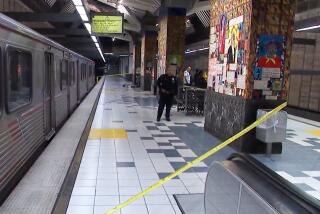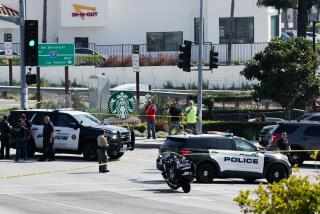MTA Ordered to Expand Its Fleet of Rapid Buses
The Metropolitan Transportation Authority must put 134 new buses into its Metro Rapid fleet under a legal order issued Thursday.
The agency’s ability to pay for the vehicles by eliminating regular local buses on the routes the new Rapid lines serve is limited by the order.
The court action by Special Master Donald Bliss is a victory for the Bus Riders Union. Earlier this year, the transit advocacy group accused the MTA of flouting a consent decree requiring the agency to improve bus service for Los Angeles County residents.
The MTA said Thursday that it was in compliance with the decree.
“Since the consent decree was signed in 1996, we have added more than 1.6 million annual bus-service hours, which have not resulted in a corresponding increase in demand,” the agency said in a statement. “To date, the additional capital and operating costs associated with this service expansion has cost taxpayers more than $1 billion.”
The decree was part of the settlement of a lawsuit that several community groups filed against the MTA in 1994.
Bliss was appointed in 1996 to oversee implementation of the agreement.
Part of the agency’s response to the decree was the Rapid Bus service, which features bright red vehicles that make fewer stops than ordinary buses.
“The MTA had implemented the Rapid Buses by reducing local services,” said Manuel Criollo, a Bus Riders Union organizer.
Under Bliss’ order, the MTA must pay for the new buses mostly with funds currently designated for services such as light rail and the subway that are unrelated to the agreement. The MTA is allowed to recoup only a third of the costs by reducing local service along the Rapid routes.
Steven Carnevale, the county attorney who represents the MTA, said it would cost about $20 million to operate the new buses -- at a time when the agency is strapped for funds.
It would be illegal, he said, to use rail money to expand bus service, because most of those funds come from earmarked federal and state grants.
The MTA has until July 31 to develop a plan to implement the new order.
More to Read
Start your day right
Sign up for Essential California for news, features and recommendations from the L.A. Times and beyond in your inbox six days a week.
You may occasionally receive promotional content from the Los Angeles Times.






